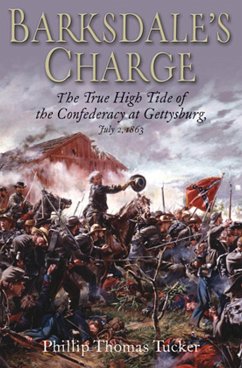There is "never a dull moment" in this "excellent account" of an overlooked Confederate triumph during the Civil War's Battle of Gettysburg (San Francisco Book Review). While many Civil War buffs celebrate Picket's Charge as the climactic moment of the Battle of Gettysburg, the Confederate Army's true high point had come the afternoon before. When Longstreet's corps triumphantly entered the battle, the Federals just barely held on. The foremost Rebel spearhead on that second day of the battle was Brig. Gen. William Barksdale's Mississippi brigade, which launched what one Union observer called the "grandest charge that was ever seen by mortal man." On the second day of Gettysburg, the Federal left was not as vulnerable as Lee had envisioned, but had cooperated with Rebel wishes by extending its Third Corps into a salient. When Longstreet finally gave Barksdale the go-ahead, the Mississippians utterly crushed the peach orchard salient and continued marauding up to Cemetery Ridge. Hancock, Meade, and other Union generals had to gather men from four different corps to try to stem the onslaught. Barksdale himself was killed at the apex of his advance. Darkness, as well as Confederate exhaustion, finally ended the day's fight as the shaken, depleted Federal units took stock. They had barely held on against the full ferocity of the Rebels on a day that would decide the fate of the nation.
Dieser Download kann aus rechtlichen Gründen nur mit Rechnungsadresse in A, B, BG, CY, CZ, D, DK, EW, E, FIN, F, GR, HR, H, IRL, I, LT, L, LR, M, NL, PL, P, R, S, SLO, SK ausgeliefert werden.


